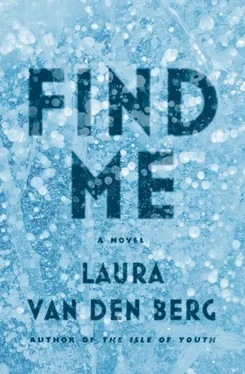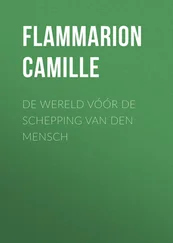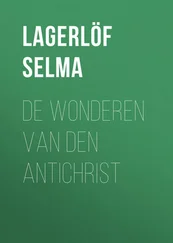“I was in the basement,” Darcie always says, even though we’ve already looked down there.
In the Mansion, Marcus and I are starting to become very curious about this basement.
There is no electricity, but there is an oil lamp that we light and carry around with us at night — or rather, Nelson carries it around. “Whoever has the light has the power,” he sings. Sometimes, after the games end, we drink the alcohol Nelson has cooked up in his lab. He says it’s made from yeast and table sugar, but I only know that it sloshes around in a green bottle and burns when I drink it. It smells sweet like the Robitussin and after it goes down, faces turn into bright blurs, like the world is a wet canvas someone can’t stop touching.
In the Mansion, our nights are long. We have started going in reverse: winter is leaving, yet our window of daylight keeps growing smaller. During these windows, we are busy. We are busy stomping through the woods, pulling up dandelion and chickweed and creeping charlie. Thistles with thorny leaves and soft purple flowers. We are busy measuring our water supply. We are busy suffocating cockroaches by coating them with the lye Nelson stores in his lab. The roaches flop over onto their backs, tiny legs kicking. We watch until the kicking stops. We are busy standing in the Dumpster and picking out what the people with means do not want. We go to bed near dawn and wake just before sunset. We are turning nocturnal. We are no longer in sync with the outside world, with the patterns of nature, but aligned with the rhythms of this house.
* * *
As it turns out, Darcie doesn’t think she can talk to God in the basement.
In the basement, there is a steel door and behind that door, a tunnel. The floor is cool dirt. The walls are dark and smooth. The ceiling is rounded and just high enough to walk upright. You can go thirty steps before the tunnel ends, cut off by a stone wall. The wall is old and the rocks are coming loose. No one knows what’s on the other side. It is in this tunnel that Darcie hears the voice of her mother, who is dead.
I wonder if the people who built this house intended the tunnel to be a safe room or fallout shelter, a place to go when the world ends.
“Dead from the sickness?” I ask Darcie, who shakes her head.
“She died a long time ago.”
She tells me and Marcus about the tunnel in the living room. Nelson is upstairs, working in the attic. We can hear the bowling ball knocking down pins. Clunk, clunk, clunk. Darcie is balled inside the trap door, her chin resting on her knees. Her hair is tucked behind her ears, her roots black and oily. It’s dusk. I look up and see tiny crystalline stars through the skylight.
“How do you do it?” I ask. “How do you hear her?”
She shrugs. Her wings rub the floor.
“It’s private,” she says. “It’s mine.”
“My mother is gone,” I say, choosing to not elaborate on what I mean by gone.
She looks at us. She chews her upper lip.
“His too,” I add, nodding at Marcus.
“Like I said, it’s my tunnel.” Darcie sniffs. “Besides, it’s not as simple as walking in and saying hello. There’s an entire ritual.”
“We can learn,” I tell her.
“You can watch.” She pauses, looks across the room. “And that’s as close as you’re going to get.”
In the basement, the ritual starts with Darcie putting four drops of a sweet-smelling liquid under her tongue. It’s something Nelson has given her, to help her remember, to help her become fully cured. On her own, she discovered that if she takes the drops and goes into the tunnel, she can hear things. Like voices. Like her mother’s voice.
“The first time it was an accident,” she tells us. “I didn’t even know there was a tunnel down here. I was just doing what Nelson said I should do. I was just wandering around and trying to remember.”
The liquid in the eyedropper is clear as water. It looks like a serious drug, like GHB or ketamine, which I have never taken before, because being dead and wanting to feel dead are not the same thing. In Mission Hill, I heard stories about girls getting drugged with GHB and waking up half-naked in backyards and in parks and in parking lots, always outdoors it seemed, only they didn’t call it GHB. It was Cherry Meth or Easy Lay or Grievous Bodily Harm.
“Hm.” I flick a finger at the eyedropper. “I’ve seen the end of that movie.”
“What movie?” Darcie says.
I’m scared of this liquid, but just because it is not something I would have taken before, in the land where there was an endless supply of cough syrup and no mother to reach, doesn’t mean I wouldn’t be willing to do it now.
“You sure you don’t want some company in there?” I do the same finger-flick at the steel door.
“In the tunnel, there is no such thing as company,” Darcie says.
She squeezes the liquid into her mouth. Next she takes off her clothes. She pulls her sweater over her head, unzips her pants. She has nothing on underneath. She doesn’t blush or turn away. She is not shy around us. I can see the fine bones in her back and the strange shape of her kneecaps. Her nipples are pinpricks of brown.
It’s cold in the basement. Cobwebs sag from the ceiling like dead skin.
We can’t help it. We stare at Darcie.
“I told you there was a ritual,” she says, as though that explains everything.
We watch her open the steel door and slip inside the tunnel. She’s gone for a long time. I look at Marcus and imagine him naked in the basement. I see his long thighs and the tight mass of his balls. The strangeness of a masked face against all that hairless skin. I pick up the eyedropper and look at the residue inside. It smells like nothing.
“I want to go in there,” I say to Marcus.
“I remember my mother well enough,” he says. “I don’t need to hear her voice.”
“Speak for yourself,” I say.
In a corner, we find a plastic baby doll with a missing arm and a dark bow-shaped mouth. We take turns putting on Darcie’s wings. I walk around the basement with the weight of them on my back. We wait for the door to open and for Darcie to come out and tell us all about what she’s heard in there.
When the door finally creaks open and Darcie spills into the basement, she’s crying. Her hair is stuck to her cheeks. She crosses her arms over her stomach and shivers.
“What’s wrong?” we want to know.
I pick up her sweater and try handing it to her. Above us there is the rumble of falling pins. “Did you not hear her?”
“Sometimes you don’t hear what you wish you would,” Darcie says.
* * *
One night, in the living room, Darcie tells us about this idea she has for a city with only one building. When we point out that a city with only one building can’t really be considered a city, she says we don’t understand.
We are taking turns drinking from the green bottle. The oil lamp is stationed on the floor and I watch an ant crawl through the circle of light. It looks injured.
“Everything cities have would exist in this one building.” Darcie reaches into the fireplace. She finds a stick and starts drawing her city in the air. A large moth touches down on a lamp shade, then flies over to a window and beats the glass with its wings.
“The building would be so tall, it would reach the stratosphere. That’s between the troposphere and the mesosphere, in case you didn’t know. It would hold millions of people, no, billions, billions of people, and roads and schools and police stations and museums and train stations and airports and restaurants.”
“That sounds crowded,” Marcus says.
“It’s a stupid idea for a city.” Nelson reaches for the bottle, his pale arm thrusting into the light.
Читать дальше












